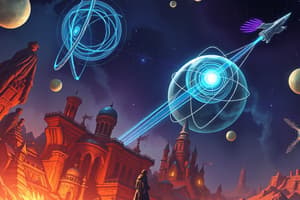Podcast
Questions and Answers
What was a significant impact of the Scientific Revolution on society?
What was a significant impact of the Scientific Revolution on society?
- It led to an increase in religious beliefs.
- It fostered developments in multiple fields of science. (correct)
- It discouraged curiosity about the natural world.
- It completely rejected previous scientific ideas.
Which factor is considered a challenge of scientific knowledge during the Scientific Revolution?
Which factor is considered a challenge of scientific knowledge during the Scientific Revolution?
- The ethical implications of scientific findings were well-regulated.
- There was no obligation for scientists to explore the applications of their work. (correct)
- Scientific knowledge is universally accepted.
- Technological progress was completely uninfluenced by politics.
What primarily motivated early scientists during the Scientific Revolution?
What primarily motivated early scientists during the Scientific Revolution?
- Societal pressure to conform to political ideologies.
- A strict adherence to religious teachings.
- A desire for fame and fortune.
- Curiosity to explore nature's activities. (correct)
What was the era of the Scientific Revolution known for?
What was the era of the Scientific Revolution known for?
During the Scientific Revolution, which sectors influenced the technological applications of science?
During the Scientific Revolution, which sectors influenced the technological applications of science?
What is the purpose of the Science, Technology, and Society (STS) curriculum?
What is the purpose of the Science, Technology, and Society (STS) curriculum?
Which of the following best describes natural science?
Which of the following best describes natural science?
What does the term 'technology' refer to in the context of STS?
What does the term 'technology' refer to in the context of STS?
Which of the following disciplines is NOT considered a natural science?
Which of the following disciplines is NOT considered a natural science?
How are society, science, and technology interconnected in STS?
How are society, science, and technology interconnected in STS?
What does the Latin word 'scientia' mean?
What does the Latin word 'scientia' mean?
In STS, applied sciences include which of the following?
In STS, applied sciences include which of the following?
What field primarily studies the interaction between technical systems and society?
What field primarily studies the interaction between technical systems and society?
What does the conclusion drawn from the travel experience indicate?
What does the conclusion drawn from the travel experience indicate?
Which step is NOT part of the scientific process?
Which step is NOT part of the scientific process?
What is the primary aim of Science and Technology Studies (STS)?
What is the primary aim of Science and Technology Studies (STS)?
According to the provided definitions, science is characterized primarily as which of the following?
According to the provided definitions, science is characterized primarily as which of the following?
Which of the following disciplines does STS incorporate to examine the nature of science and technology?
Which of the following disciplines does STS incorporate to examine the nature of science and technology?
What is a key element in the definition of science according to Gribbin (2003)?
What is a key element in the definition of science according to Gribbin (2003)?
What does the scientific process help individuals to do?
What does the scientific process help individuals to do?
Which of these definitions portrays science as a cultural activity?
Which of these definitions portrays science as a cultural activity?
What does Bybee (1997) suggest about the nature of science?
What does Bybee (1997) suggest about the nature of science?
In the context of a journey to school, which hypothesis suggests the best timing to leave home?
In the context of a journey to school, which hypothesis suggests the best timing to leave home?
What factor primarily affects the decision of which mode of transport to use for the journey?
What factor primarily affects the decision of which mode of transport to use for the journey?
What is the purpose behind sharing findings with other students experiencing similar issues?
What is the purpose behind sharing findings with other students experiencing similar issues?
Which statement best represents the influence of various definitions of science?
Which statement best represents the influence of various definitions of science?
How can one validate their hypothesis about the best transport option to school?
How can one validate their hypothesis about the best transport option to school?
What aspect of STS aims to bridge cultures between humanities and natural sciences?
What aspect of STS aims to bridge cultures between humanities and natural sciences?
What is a common misconception regarding scientific processes in daily life?
What is a common misconception regarding scientific processes in daily life?
Flashcards are hidden until you start studying
Study Notes
Science, Technology, and Society (STS)
- STS is an interdisciplinary course aimed at understanding the interactions between science, technology, and society.
- The curriculum fosters a critical appreciation of the impact of science and technology on human development and societal issues.
- The field incorporates natural sciences (e.g., biology, chemistry) and social sciences (e.g., sociology, psychology).
Definitions of Key Concepts
- Science: Derived from the Latin "scientia", meaning knowledge. Refers to systematic observations and methods to understand natural phenomena.
- Technology: From the Latin "techne", meaning skill or art. Involves applying scientific knowledge to create tools, services, and solutions for societal problems.
- Society: A structured community of individuals living together, interacting within various social, cultural, political, and economic contexts.
Objectives of STS Course
- Equip students to critically engage with the complexities introduced by science and technology.
- Encourage students to apply scientific principles to address social issues and contribute to national development.
- Promote awareness and collective action towards societal challenges influenced by scientific progress.
Understanding Scientific Processes
- Everyday life employs scientific methods to solve problems (e.g., planning commutes).
- The scientific method includes identifying problems, making observations, forming hypotheses, conducting experiments, collecting data, analyzing results, and drawing conclusions.
Conceptual Understanding of Science
- Various definitions emphasize the observation, investigation, and theoretical explanation of natural phenomena.
- Science is portrayed as a continual dialogue with nature, engaging in intellectual inquiries to expand our understanding of the world.
- It is seen as both a cultural and social activity, guided by individual and collective experiences.
Influences on the Concept of Science
- Definitions of science have evolved from individual experiences, survival instincts, and a desire to understand natural occurrences.
- The curiosity about nature has led to the establishment of different scientific branches.
Scientific Revolution (16th - 18th Century)
- This period was marked by profound advancements in mathematics, physics, astronomy, biology, and chemistry.
- The revolution modernized scientific understanding and practices, laying the groundwork for contemporary scientific methodologies.
- It represented a transformative era that led to significant innovations and discoveries.
Challenges of Scientific Knowledge
- Scientific knowledge often lacks ethical considerations, with scientists not obligated to disclose potential applications.
- The influence of other sectors (politics, religion, business) affects the application of scientific knowledge.
- Rapid scientific and technological advances pose challenges to societal norms and daily living.
Research Recommendations
- Explore contributions of key figures in science and mathematics during the Scientific Revolution.
Studying That Suits You
Use AI to generate personalized quizzes and flashcards to suit your learning preferences.




